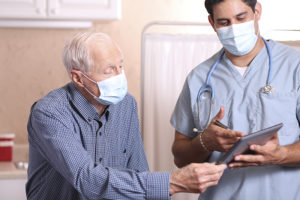September 4, 2020

Call on Continuum for solutions to elderly health care issues.
The COVID-19 pandemic put the world on pause, including, among various other activities, healthcare appointments and procedures. As a matter of fact, approximately half of all adults either canceled or postponed routine health care and elective treatments since the coronavirus crisis began, leading medical professionals to grow concerned about the effects and that elderly health care issues may arise from the delay in care.
As we tentatively strive for a new normal, it is necessary to speak with your health care provider about any procedures you may have been considering pre-pandemic, and to get answers to these particular questions that will help you measure the safety of following through with them now.
- Is the healthcare facility where I will be treated also treating COVID-19 patients, and are the same medical professionals who will take care of me also caring for them? If that’s the case, what safety measures are in place to guarantee my safety?
- What are the facility’s cleaning/disinfecting policies?
- Will I need to be tested for COVID-19 before my procedure?
- Are medical employees being tested for COVID-19? If that’s the case, how frequently?
- Do I need to wear a mask? Gloves? Any other personal protective equipment?
- Are there any things that are restricted from being brought with me, such as books, clothing, a phone or laptop?
- Can I fill out paperwork ahead of time?
- May I wait outside or in my car until I am called in for my procedure?
- Can a member of my family or caregiver accompany me?
- Is follow-up provided in person, or may I make use of telehealth?
Additionally there are post-procedure considerations to think through. Many people face concerns with regards to the risk of contracting COVID-19 after being in the hospital, so talk to your medical professional in regards to the need to self-monitor for symptoms, and for tips about any further safeguards you might need to take, for example, avoiding contact with other people for some time, wearing gloves or a mask in the home when others are there, additional sanitizing measures to take, etc. The doctor may suggest taking your oxygen levels and temperature at home. If so, make sure to purchase a thermometer and pulse oximeter.
Once you’re satisfied with the answers you’ve received along with the assurance that the procedure is safe to schedule, contact Continuum. Our transitional care services can help make sure that everything is taken care of before, during, and after your procedure, including transportation, picking up groceries and prescription medications, helping you get settled in back at home and monitoring for any variations in condition, and much more. Connect with us any time at (314) 863-9912 and learn more about our senior home care in St. Charles and surrounding communities. If you’d like to learn more about the specific areas that we serve in Missouri, please visit our Service Area page.
